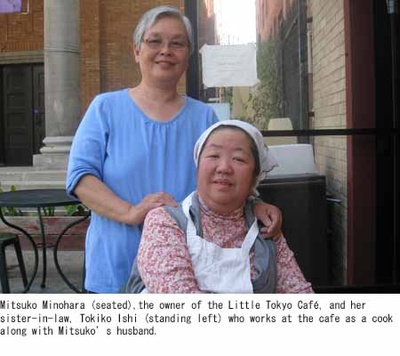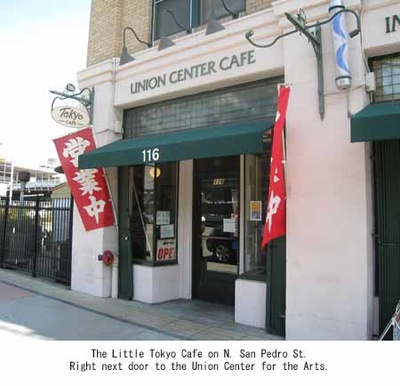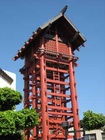Mitsuko Minohara is the owner of the cozy Little Tokyo Café located at 116 N. San Pedro Street in Los Angeles. Mitsuko is a second-generation Japanese American and was born in Manzanar, California, in 1943. Manzanar served as one of the ten concentration camps that contained roughly 120,000 Japanese Americans during World War II. Mitsuko and her family came to Los Angeles in 1946, a year after the WRA (War Relocation Authority) closed Manzanar. Mitsuko has four children: an older son who is a computer programmer at Universal Studios, two daughters who work for the Los Angeles Police Department, and her youngest son who works with her at the café. Mitsuko works alongside her husband, son, friend Yumi-san, and sister-in-law, Tokiko Ishi, an immigrant from Kyushu, Japan. Tokiko moved to Los Angeles in 1967, and eventually married Mitsuko’s older brother, who was the café’s previous owner. Ten years ago, Tokiko’s husband passed away, leaving the Little Tokyo Café in Mitsuko’s hands. Mitsuko’s involvement with the café is fairly recent, but the family has been involved in the restaurant business since 1929.
Mitsuko’s mother was from Wakayama, Japan, and she came to the U.S. in the early 1920s. Mitsuko’s father came from Japan in 1927, after Mitsuko’s mother already had established a restaurant and worked as the chef. After the attack on Pearl Harbor, President Franklin D. Roosevelt signed Executive Order 9066, which had the WRA create concentration camps for Japanese Americans. This order forced 120,000 Japanese Americans, including Mitsuko’s parents, to relocate to ten concentration camps, one of which was located in Manzanar. Mitsuko is too young to remember growing up in Manzanar but she did eventually return to visit and was impressed with the beautiful snow-covered mountain ranges. Looking back, she says it was a very nice experience and commented that “the surroundings were all rocks and broken window panes.” But now the area has been redeveloped and includes a small cemetery, the Manzanar monumental stones and a computerized museum that lists the families that were registered there.
Mitsuko says that while her family was in Manzanar, they were thinking of returning to Japan because all their relatives were there. After moving the family to Tule Lake, Mitsuko’s father decided they should not move back to Japan since “they lost the war back home.” He decided it would be better if the family stayed in Tule Lake and sent whatever they could back to their family in Japan to support them. The last time Mitsuko was in Japan was in 1965. She had fond memories of her visit and declares that when her husband retires, she would like to go back. After the war, Mitsuko's parents decided to move to Los Angeles, where Mitsuko’s mother opened the Little Tokyo Café at 2nd Street and San Pedro. The café has changed locations twice since then, though its ownership has stayed within the family. Mitsuko feels no pressure to uphold the family tradition. “If everyone [working at the restaurant] decides they cannot do it then we might as well stop but they want to do it. They are competent.”
Mitsuko’s husband comes from a family of Japanese beauticians. He left Japan and came to Los Angeles to learn cosmetology. During this time, Mitsuko was attending cosmetology school. She had just graduated from high school but had missed the deadline to register for college due to knee surgery. Her mother suggested that she try cosmetology to have skills to fall back on. Mitsuko first met her husband at her cosmetology school, where she was asked to help him because but had trouble speaking English. Mitsuko had never planned on running a restaurant, as the restaurant business was entirely her brother’s interest.
Her mother trained Mitsuko’s brother to run a restaurant and to cook but she also needed someone to look after the books. As a result, Mitsuko went to UCLA and studied accounting. After, she became the café’s bookkeeper and then went on to become a CPA. Later, she went to work at the local federal building as an auditor for a number of years. When her husband fell ill, she left her job and went back to school. After her husband completely recovered, they returned to their old ways and he went back to working at the café. Mitsuko describes her cooking as “amateur”; she leaves the cooking to her husband and Tokiko. According to Mitsuko, they are keeping up the tradition just as her mother would have wanted. It took her mother a long time to establish the business and Mitsuko would not allow her mother’s hard work to be in vain. Now the café provides the Minoharas with a place where they can all work together.
Mitsuko was brought up in a traditional Japanese family and she attributes this to her mother’s “old-time mentality.” When asked if she felt any pressure growing up to be more Japanese, Mitsuko said she felt none. She grew up in West Hollywood and around there they had a lot of American neighbors. She stated that the Japanese people wanted to become Americans because they could not go to Japan after the war. As a result, the Issei [first-generation Japanese Americans] struggled with the language and the customs. Mitsuko thought it was hard for the Issei to Americanize because everything was so different, though they were eventually able to adapt. For example, Mitsuko’s mother learned Spanish because there were a lot of Spanish speakers in the area during that time. In fact, Mitsuko said her mother spoke Spanish better than she did English. She was able to adapt to the people living in her area and learned a new language that would assist her. Mitsuko’s children speak Japanese because she felt that it was important to continue her family heritage. It appears that Mitsuko did adopt some of her mother’s traditional mentality for she wishes that her grandchildren have some knowledge of Japanese as well.
Mitsuko has noticed that Little Tokyo is changing gradually. The number of first-generation immigrants is shrinking because most of them have moved to the expanding Japantowns in Gardena and Torrance. She has also noticed the influx of Korean Americans who are buying out places such as the Mitsuwa Market Mall in Little Tokyo.
Little Tokyo Towers, an apartment complex, used to be inhabited by many Japanese Americans but now there are a lot of Korean occupants. According to Mitsuko, the Koreans have been buying condos, renting apartments and setting up popular Korean barbeque restaurants in and around Little Tokyo. Mitsuko did not think the growing Korean population was an issue and in fact thought this was a good change. She acknowledged that as time goes on, things change and all one can do is adapt. She also talked about how a lot of apartments and condominiums were being built and how there is a need for a new market. She claimed that the people living in these new residences would enjoy and benefit from a shopping mall.
When asked about today’s youth and their exposure to things Japanese, Mitsuko stated that the youth “need a better introduction to what Japanese really is.” She said that young people’s perception of Japanese culture is based on what they see in the movies where a modernized version of the culture is depicted. She is in full support of this because it draws more people to Little Tokyo; however, she thinks the youth should also learn about the old time traditions which she and her family engage in such as boy’s day, girl’s day and the New Year’s tradition. Many of these old traditions are being taught at the churches and temples in Little Tokyo. According to Mitsuko, there are a lot of Catholics, Presbyterians and Buddhists in the area. The neighborhood's Union Church is attracting the younger generation who live in these new condominiums so as not to lose supporters.
Mitsuko thinks the future of Little Tokyo is up in the air. There is talk of redevelopment but all she has seen are condos and apartments. The businesses are all the same as before. She stated that everything is becoming expensive for the store owners on 2nd Street. A number of the longtime businesses are moving out and new people are coming in and bringing new business. Despite the difficulties that the stores on 2nd Street face, the Little Tokyo Café continues to do well.
The café is not open for very long. The restaurant’s hours are from 11 a.m. to 2 p.m., Monday to Saturday. It is located next to the arts center that houses the East West Players, an Asian American theater organizations whose photos are proudly displayed on the café’s walls. Mitsuko said that when the play house had a show in the evening, the café used to stay open late and they may start doing that again. But both Mitsuko and her husband are getting older so according to her “there is no pressure.” She thinks it’s good to have the business in the family because they can determine when to work and when to rest. When asked if she thought her youngest son would eventually take over the family business, Mitsuko claimed “he can’t do it by himself and his brothers and sisters don’t want to.” It appears that Mitsuko’s son will look for employment elsewhere after his parents retire and they are content with that. Hopefully, the Minoharas’ retirement from the restaurant business is a long way away.
* Discover Nikkei partnered with Professor Morgan Pitelka of Occidental College and his students taking the Spring 2009 seminar "Japanophilia: Orientalism, Nationalism, Transnationalism" on a meaningful community-based documentation project. The students interviewed owners of five long-time Little Tokyo businesses to create Nikkei Album collections and articles.
View the Nikkei Album collection: The Little Tokyo Café
©2009 Jamal Fahim





